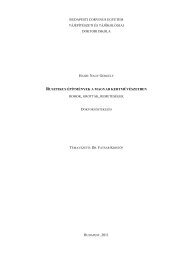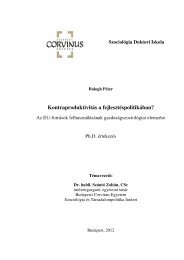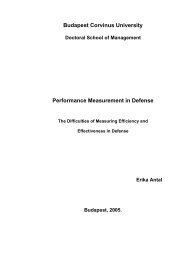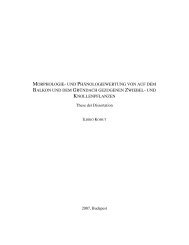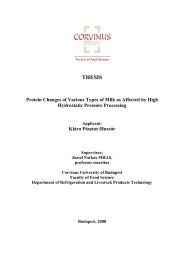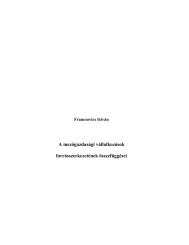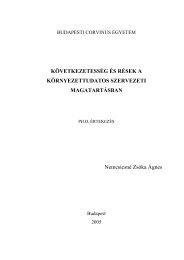értekezés - Budapesti Corvinus Egyetem
értekezés - Budapesti Corvinus Egyetem
értekezés - Budapesti Corvinus Egyetem
You also want an ePaper? Increase the reach of your titles
YUMPU automatically turns print PDFs into web optimized ePapers that Google loves.
[2003] discovers that corporate governance variables are significant in explaining a firm’s<br />
hedging decision, whereas proxies for frictional costs, such as leverage, are not.<br />
A mintavételezési torzítás hipotézise<br />
Lookman [2005b], hence, tests an alternate hypothesis, referred to as the aliasing<br />
hypothesis, which posits that hedging does not causally increase firm value. Rather, the<br />
apparent valuation effect arises simply because hedging is a noisy proxy for other factors<br />
that have a marked effect on firm value and that have not been previously considered when<br />
analyzing the firm value – hedging relationship. He focuses on agency conflict and<br />
managerial skill explanations as a candidate set of possible omitted factors, and then<br />
examine whether hedging remains significant in explaining firm value after also<br />
controlling for these factors. 200<br />
He finds that controlling only for the operating efficiency (superior managerial skills)<br />
reduces the apparent hedging discount by about 40%, and hedging is no longer statistically<br />
significant in explaining firm value. If also controlling for agency costs, the hedging<br />
discount decreases in magnitude by 60%. Finally, including the financing efficiency index<br />
(CFO’s skill) virtually eliminates the discount, with the total reduction being on the order<br />
of 90+%. His results are consistent with the aliasing hypothesis: with the inclusion of these<br />
factors, the magnitudes of the valuation effects attributed to hedging are considerably<br />
reduced, and hedging is no longer a significant explanatory variable for firm value.<br />
Lookman [2005b] looks for answers to why managerial skills and agency conflicts may<br />
correlate hedging policy and firm value. In firms with high agency conflicts between<br />
managers and shareholders, managers might be engaging in a variety of value-destroying<br />
activities – as described in earlier sections. As suggested by Tufano [1998], for example,<br />
200 Lookman [2005b] uses institutional and insider ownership, and the corporate governance index developed<br />
by Gompers et al. [2003] to construct proxies for agency costs between managers and shareholders, and<br />
develops two indexes based on production information and capital structure to proxy for managerial quality.<br />
His underlying assumption is that if management owns a significant portion of the company, its incentives<br />
will be better aligned with that of outside shareholders, resulting in low agency conflicts. Similarly,<br />
institutional investors are more likely to monitor management and ensure they work in the interest of the<br />
shareholders. With respect to managerial skills, he assumes that firms with superior management will also<br />
have higher levels of production and a higher proportion of productive assets. Furthermore, by measuring of<br />
how close to optimal is the capital structure of the firm from the perspective of the trade-off theory, one can<br />
proxy for the CFO’s skills.<br />
196



